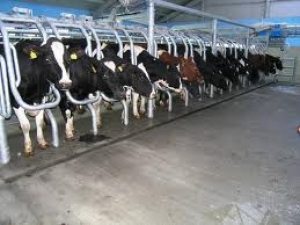Dairy Experts

So while day-length duration will remain constant, we have to anticipate entirely new combinations of conditions. These will not have previously been experienced anywhere in the world by the crops on which we and our farm animals depend. If the levels of food production we'll require in the future are to be secured, steps to adapt to these changes need to be taken now.
That's the clear assessment from experts at the Agriculture and Horticulture Development Board (AHDB) in response to the government's recently proposed National Adaptation Programme on climate change, focused on the next 20 years. The response also confirms AHDB's commitment to give farmers and growers practical support on adaptation.
In welcoming the chance to join the Defra-led consultation, the levy board identifies water availability and management as the most immediate concern for UK agriculture in adapting to climate change, since it impacts on arable crops, horticulture and livestock production. Investment will be needed in new infrastructure for water capture and storage, as well as research to discover new ways of increasing water use efficiency in agricultural production systems.
Chief Scientist at AHDB, Professor Ian Crute, said: "We're going to need to start developing crop and livestock types and production systems that are well adapted and resilient to the changing combinations of environmental conditions we experience in the future.
"Increased and well-targeted investment in the application of crop and livestock genomics is going to be absolutely essential. Soils and the semi-natural ecosystems that impact on agricultural production are also going to be affected by climate change and we need to better understand what these impacts will be and adapt accordingly," he added.
"Farmers and growers continuously adapt and innovate in response to change but, certainly, effective new knowledge acquisition and exchange will be essential if the agriculture industry is to adapt to changes in our climate at the appropriate pace. AHDB is committed to helping farmers and growers to adopt practical adaptation measures, making sure that industry advice is consistent and always based on sound evidence.
"Our own applied research, such as the evaluation of new crop varieties, will continue and evolve over time to meet these challenges.
"I can also see that changes to the way agriculture operates in adapting to new weather conditions will require careful communication with the public, to explain why we need to build more on-farm reservoirs, for example.
The AHDB view of adapting to climate change also focuses on soil quality and on new potential challenges to crop and animal health.
Insect pests and insect-transmitted plant and animal diseases are a concern. As AHDB sees it, effective surveillance and pre-emptive research will be needed to reduce the risk of exotic diseases and pest outbreaks.
With the vital need to up the pace on restoring levels of organic matter content in soils, more thought will need to be given to how such restoration and maintenance will be affected by changes in agricultural practices or temperature-induced increases in the rate of breakdown of organic matter.























